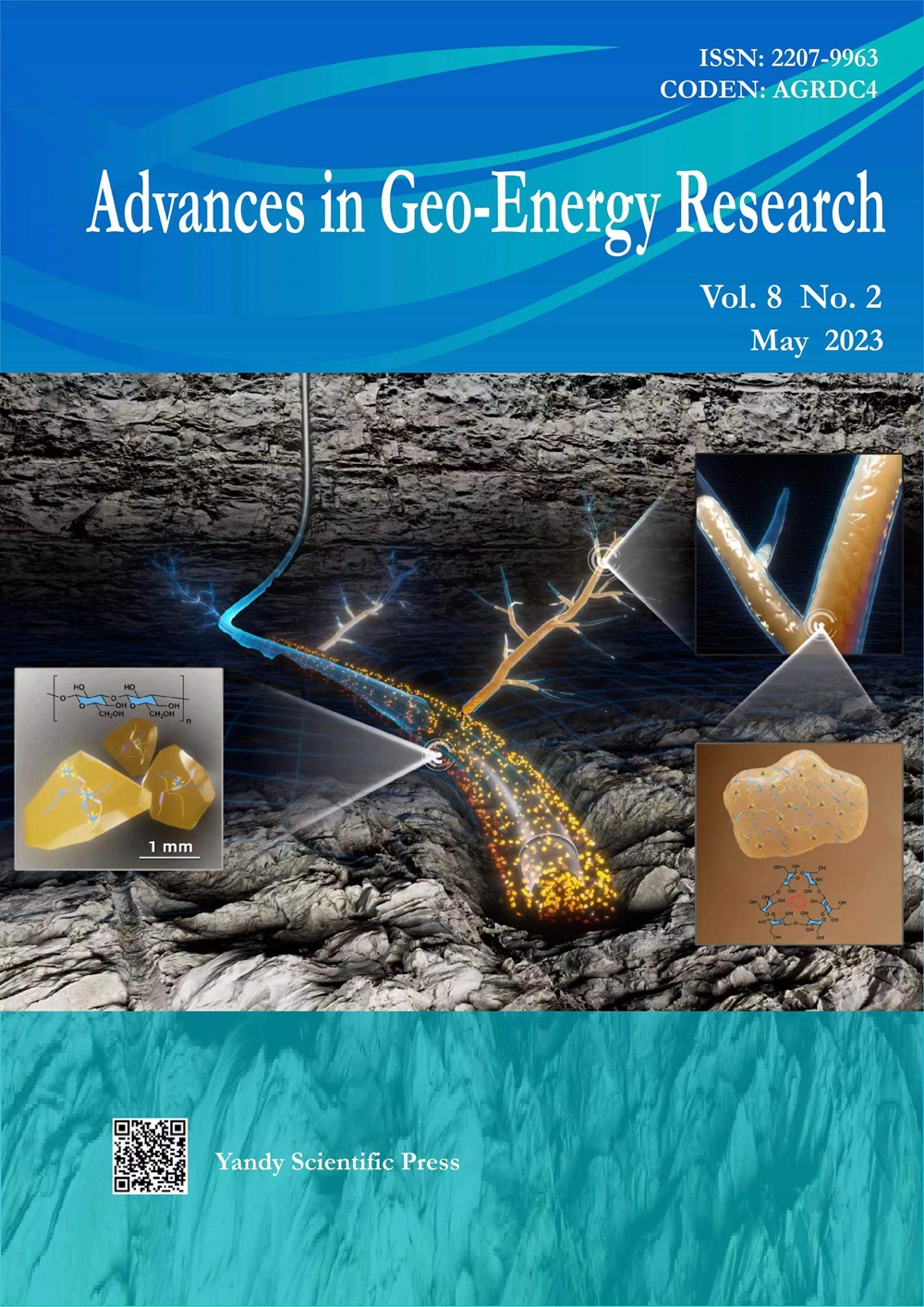Numerical well test model of oil-water two-phase flow in fractured and vuggy carbonate reservoir
IF 10
1区 地球科学
Q1 ENERGY & FUELS
引用次数: 0
Abstract
Fractured and vuggy carbonate reservoirs present a complex storage space with irregularly distributed fractures and caves. Furthermore, these reservoirs typically feature the presence of a substantial bottom aquifer, further complicating the fluid flow dynamics. At present, most well test models for this reservoir are based on discrete media primarily address single-phase flow scenarios, typically considering caves as equipotential bodies. This approach cannot accurately represent the complexities of such reservoirs. In this paper, a three-dimensional numerical well test model for two-phase oil-water flow within fractured and vuggy carbonate reservoirs is introduced. Randomly generated natural fractures are embedded within the reservoir, and the Hagen-Poiseuille law is utilized to describe fluid flow within cave spaces, effectively coupling flow interactions across fractures, caves and the porous rock matrix. The computational domain is discretized by a perpendicular bisection grid, and the finite volume method is used to solve the model, allowing for the calculation of the pressure and saturation fields at each time step. Subsequently, well test type curves are constructed and analyzed, flow regimes are segmented, and sensitivity analysis of model parameters is conducted. The pressure buildup data from well A are interpreted, and the results demonstrate a remarkable agreement between the well test curve and actual data, confirming the capability of the model to capture reservoir characteristics and complex fluid flow phenomena. The findings lay the foundation for the development of numerical well test models tailored to fractured and vuggy carbonate reservoirs. Document Type: Original article Cited as: Xu, G., Yin, H., Zhang, D., Fu, J., Xing, C. Numerical well test model of oil-water two-phase flow in fractured and vuggy carbonate reservoir. Advances in Geo-Energy Research, 2023, 10(2): 91-103. https://doi.org/10.46690/ager.2023.11.04缝洞型碳酸盐岩油藏油水两相流数值试井模型
缝洞型碳酸盐岩储集空间复杂,缝洞分布不规则。此外,这些储层通常具有大量底部含水层的存在,这进一步使流体流动动力学变得复杂。目前,该油藏的大多数试井模型都是基于离散介质,主要针对单相流场景,通常将洞穴视为等势体。这种方法不能准确地反映此类油藏的复杂性。本文介绍了缝洞型碳酸盐岩储层两相油水流动的三维数值试井模型。随机生成的天然裂缝嵌入到储层中,利用Hagen-Poiseuille定律来描述洞穴空间内的流体流动,有效地耦合了裂缝、洞穴和多孔岩石基质之间的流动相互作用。采用垂直等分网格对计算域进行离散,采用有限体积法求解模型,计算出各时间步长的压力场和饱和度场。随后,构建并分析了试井型曲线,对流态进行了分段,并对模型参数进行了敏感性分析。对A井的压力累积数据进行了解释,结果表明试井曲线与实际数据非常吻合,证实了该模型能够捕捉储层特征和复杂流体流动现象。这些发现为开发适合裂缝性和溶洞性碳酸盐岩储层的数值试井模型奠定了基础。徐刚,尹辉,张东,付军,邢成。裂缝洞型碳酸盐岩储层油水两相流数值试井模型。地球能源研究进展,2023,10(2):91-103。https://doi.org/10.46690/ager.2023.11.04
本文章由计算机程序翻译,如有差异,请以英文原文为准。
求助全文
约1分钟内获得全文
求助全文
来源期刊

Advances in Geo-Energy Research
natural geo-energy (oil, gas, coal geothermal, and gas hydrate)-Geotechnical Engineering and Engineering Geology
CiteScore
12.30
自引率
8.50%
发文量
63
审稿时长
2~3 weeks
期刊介绍:
Advances in Geo-Energy Research is an interdisciplinary and international periodical committed to fostering interaction and multidisciplinary collaboration among scientific communities worldwide, spanning both industry and academia. Our journal serves as a platform for researchers actively engaged in the diverse fields of geo-energy systems, providing an academic medium for the exchange of knowledge and ideas. Join us in advancing the frontiers of geo-energy research through collaboration and shared expertise.
 求助内容:
求助内容: 应助结果提醒方式:
应助结果提醒方式:


